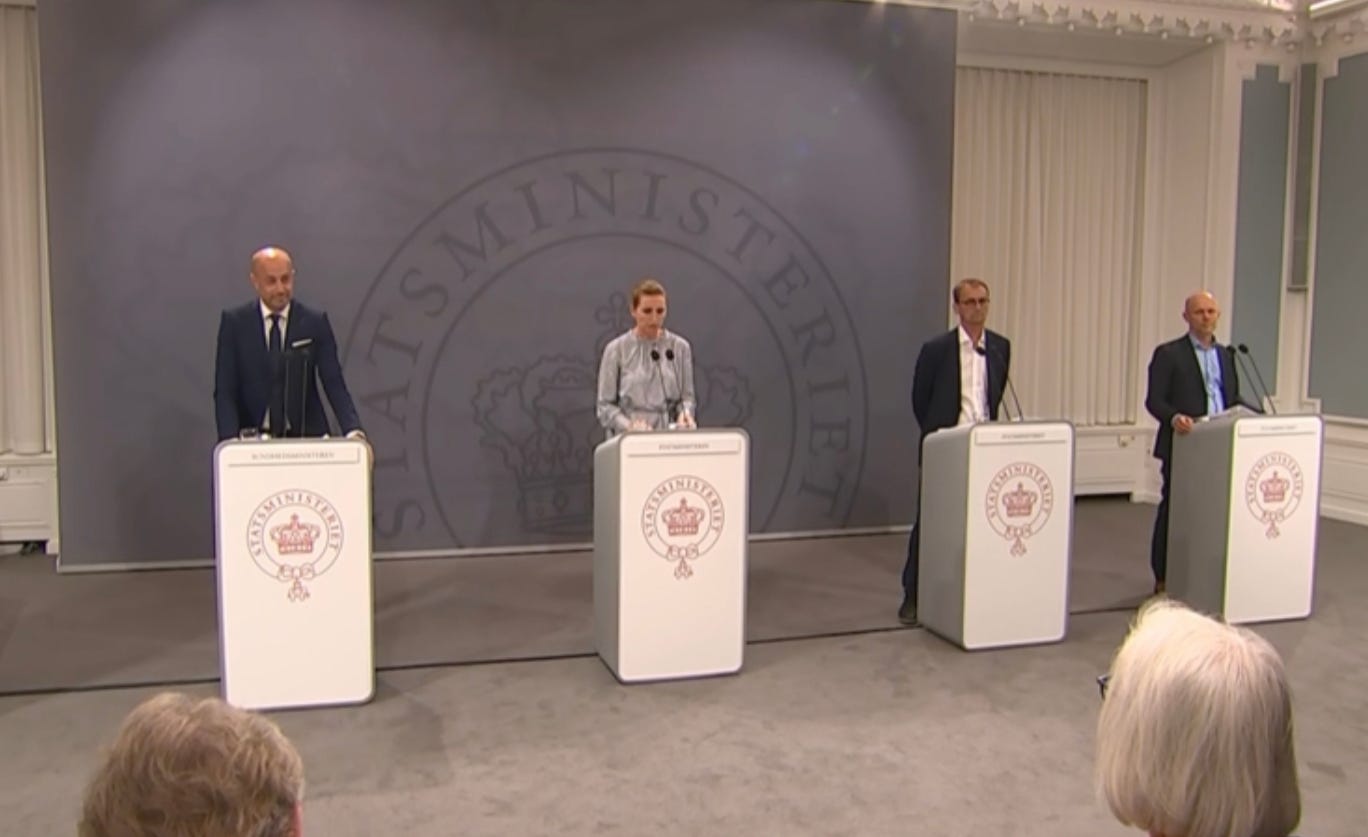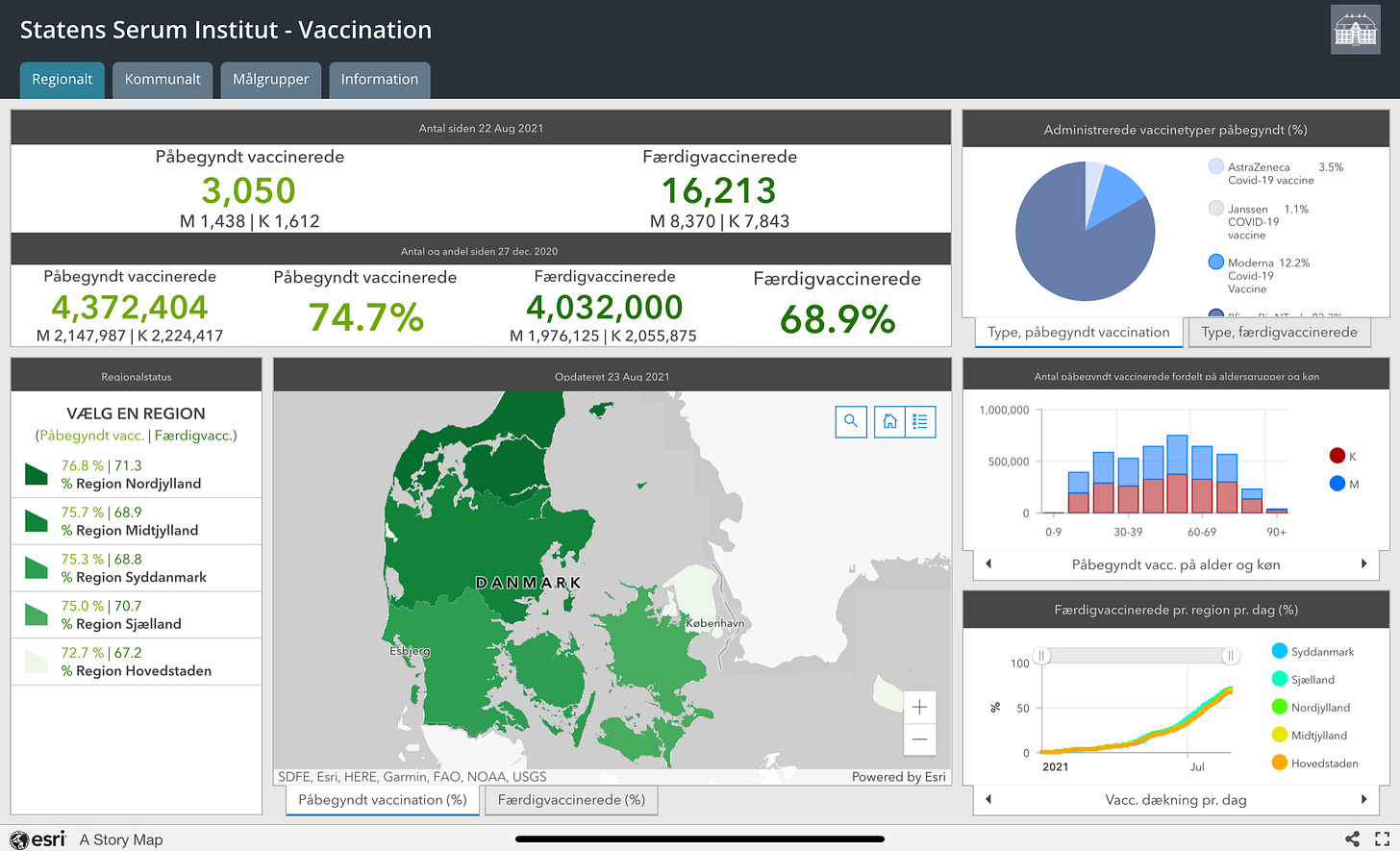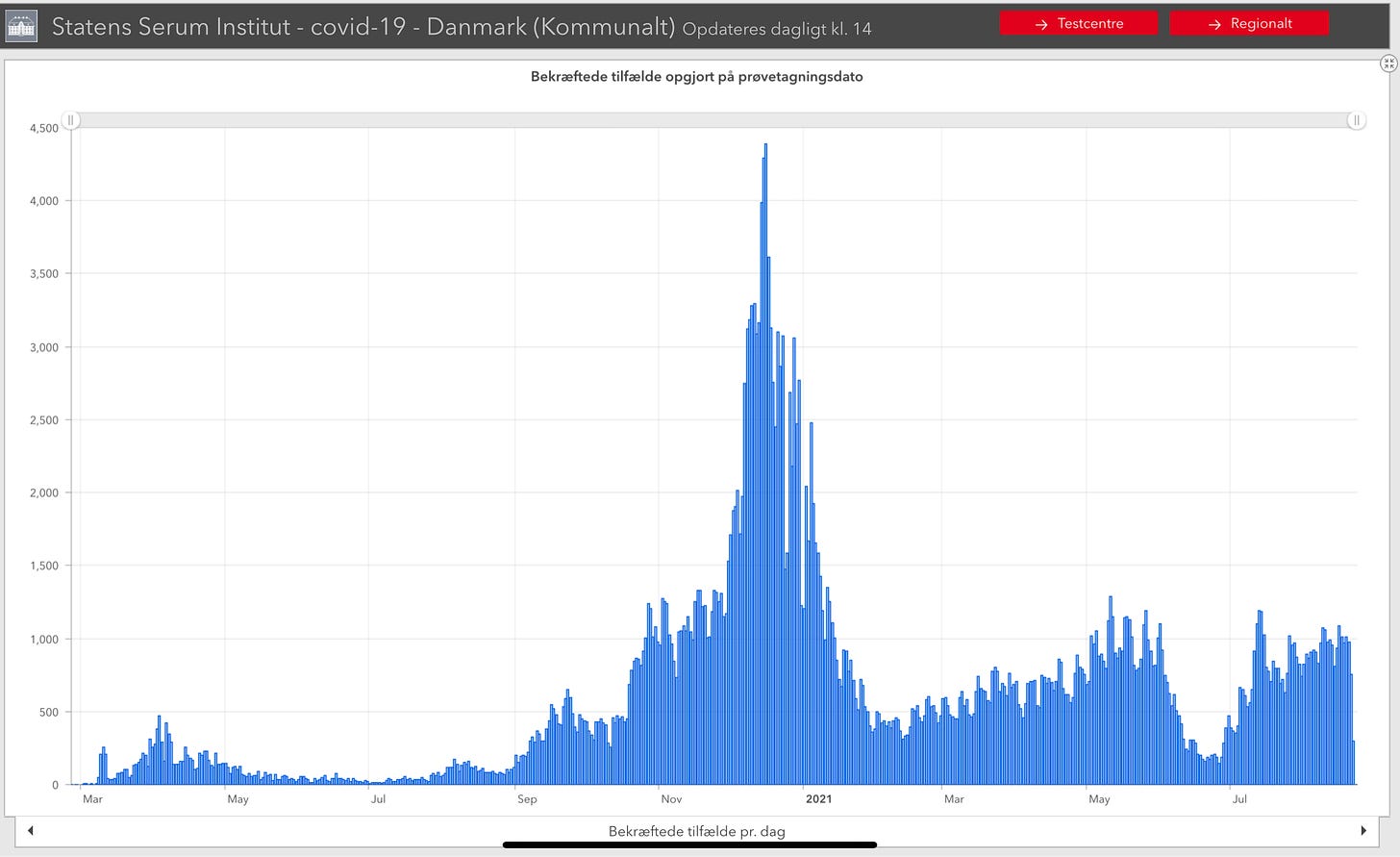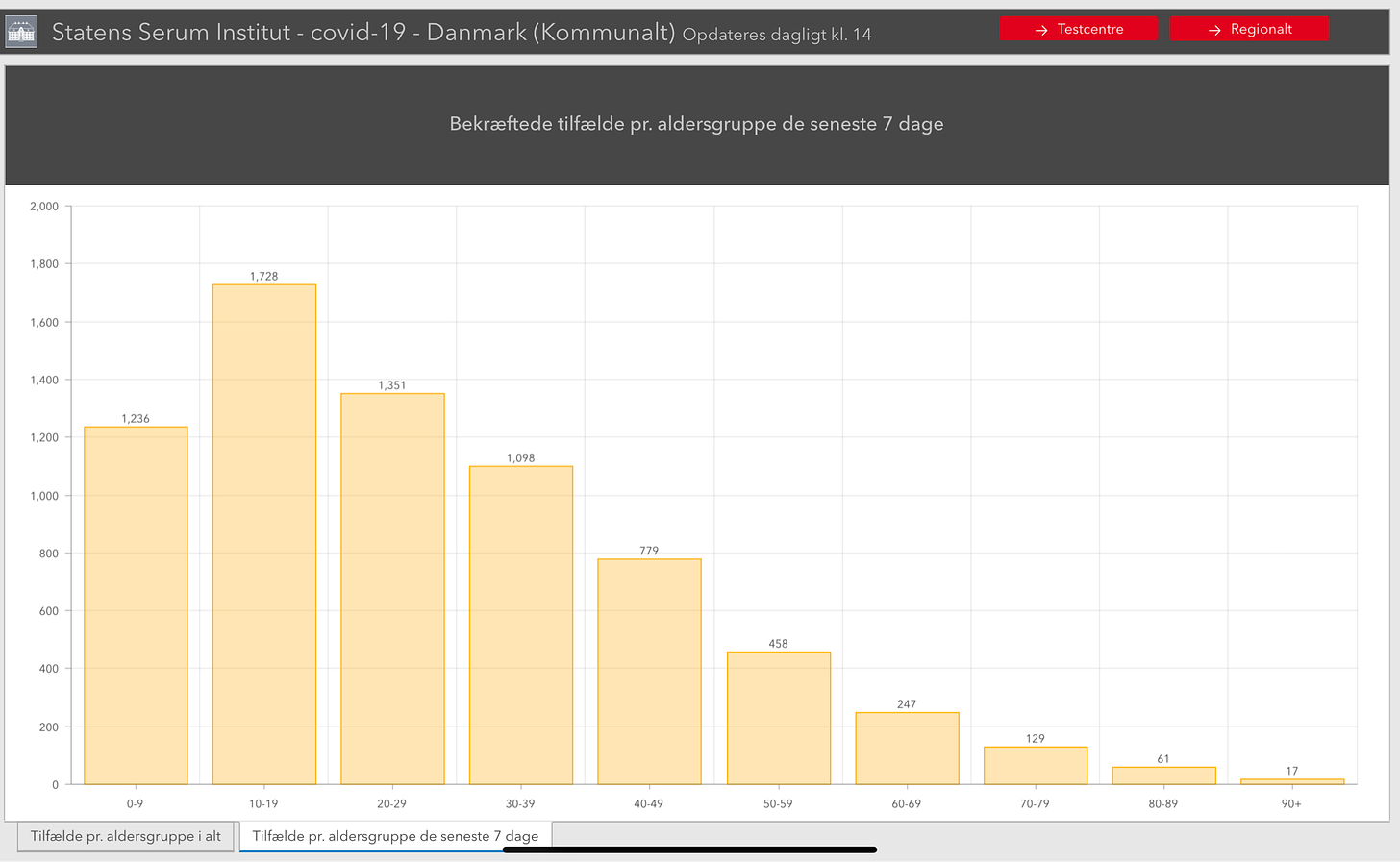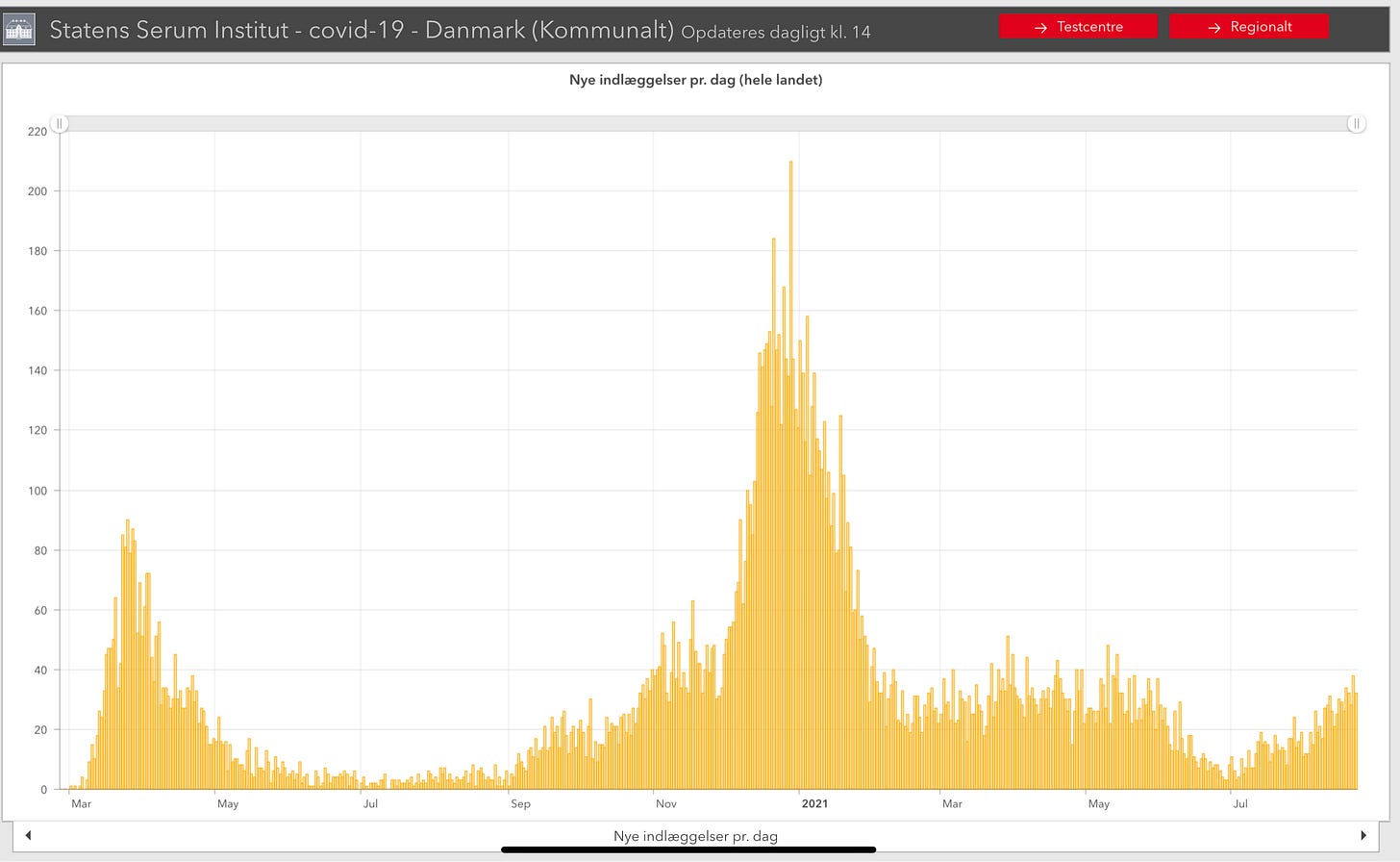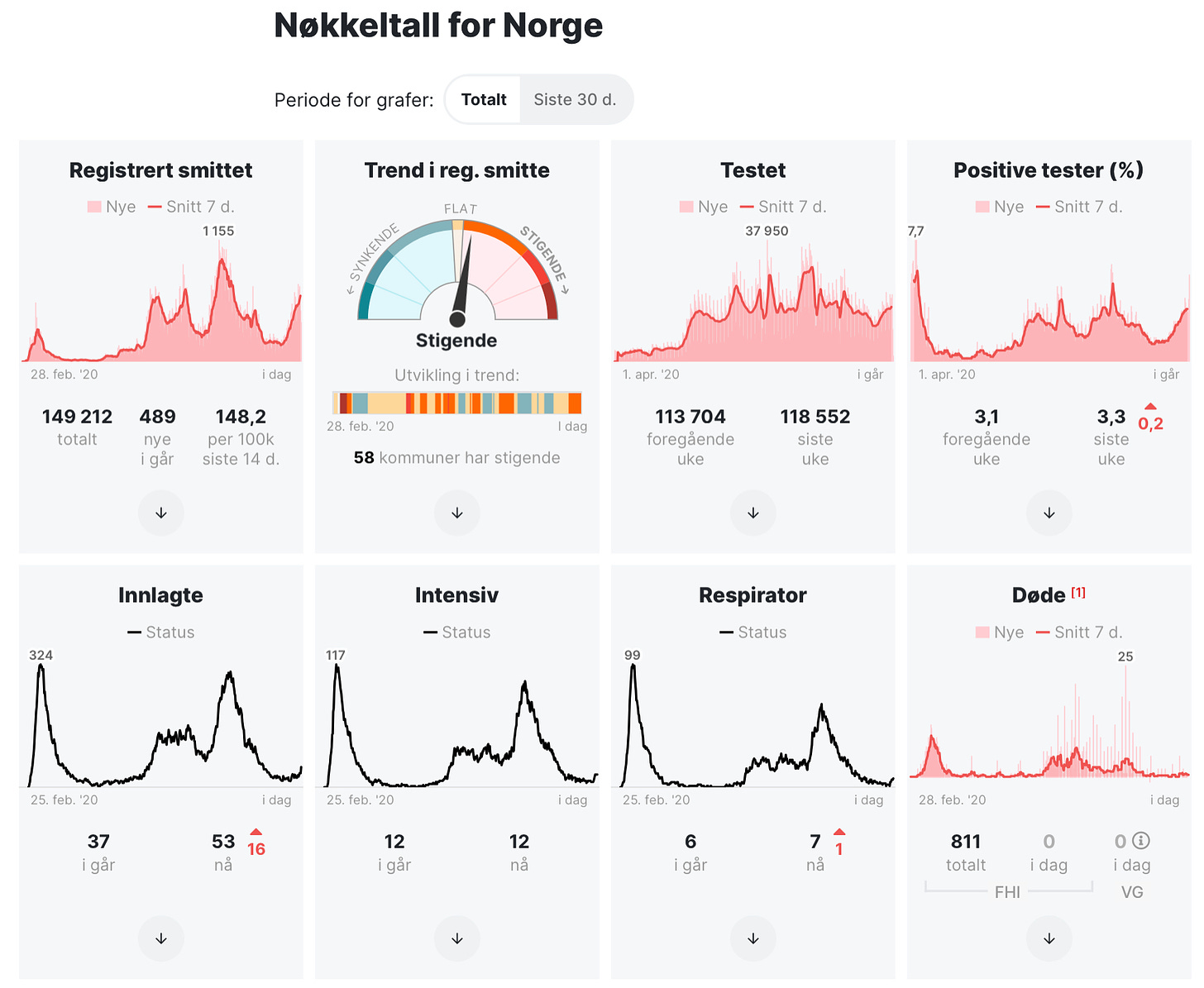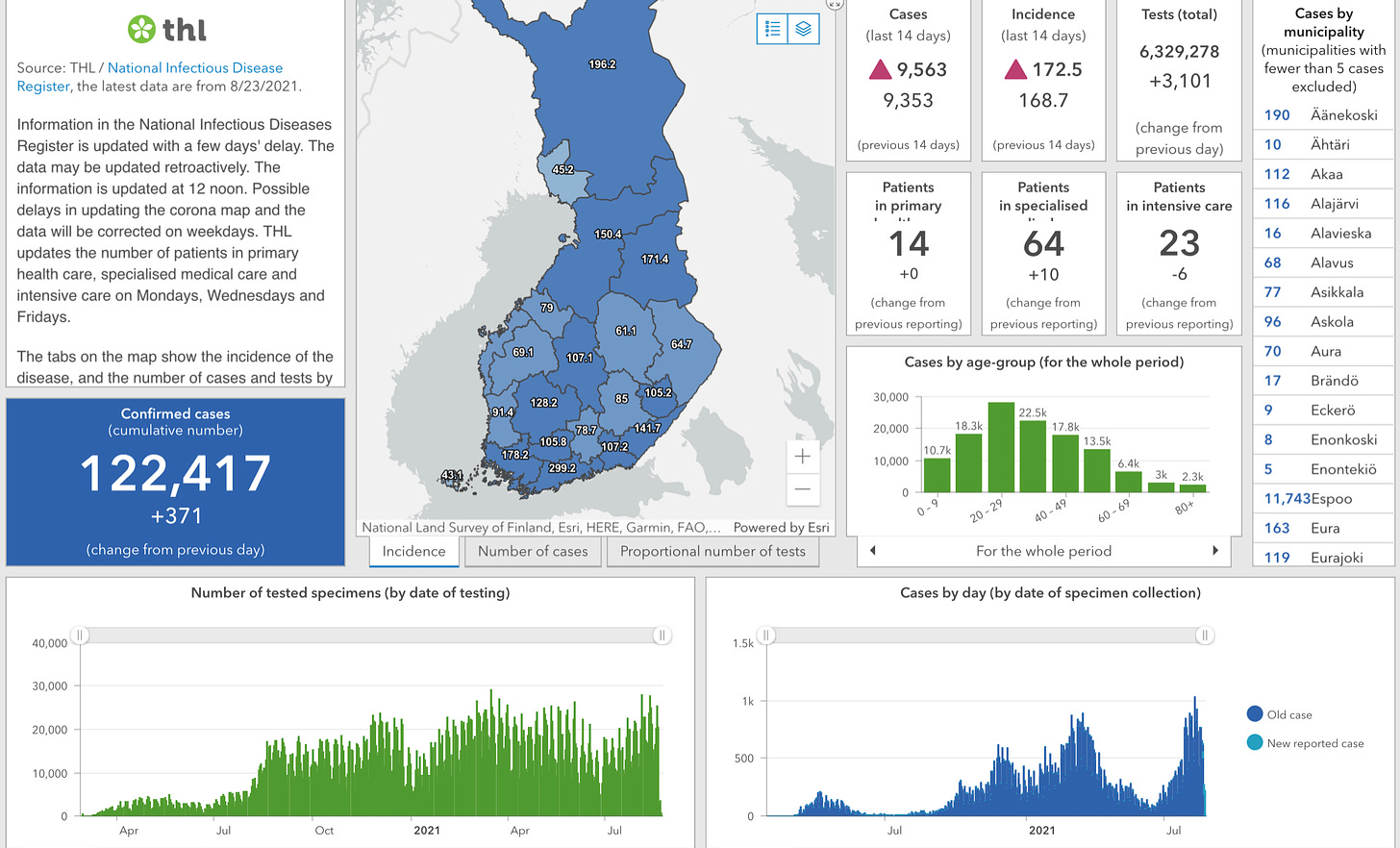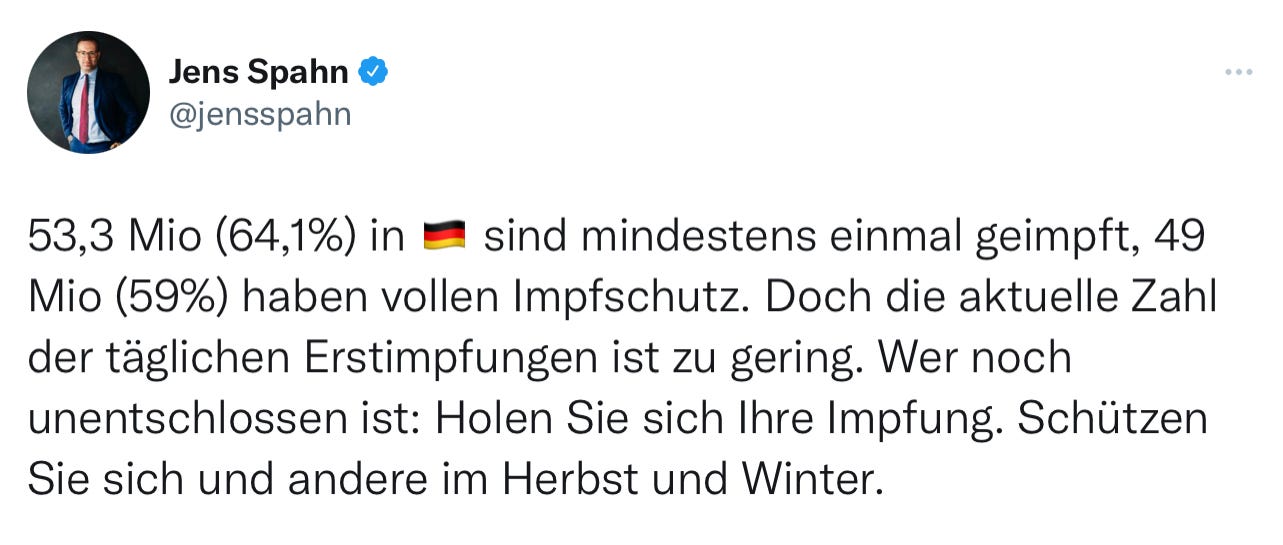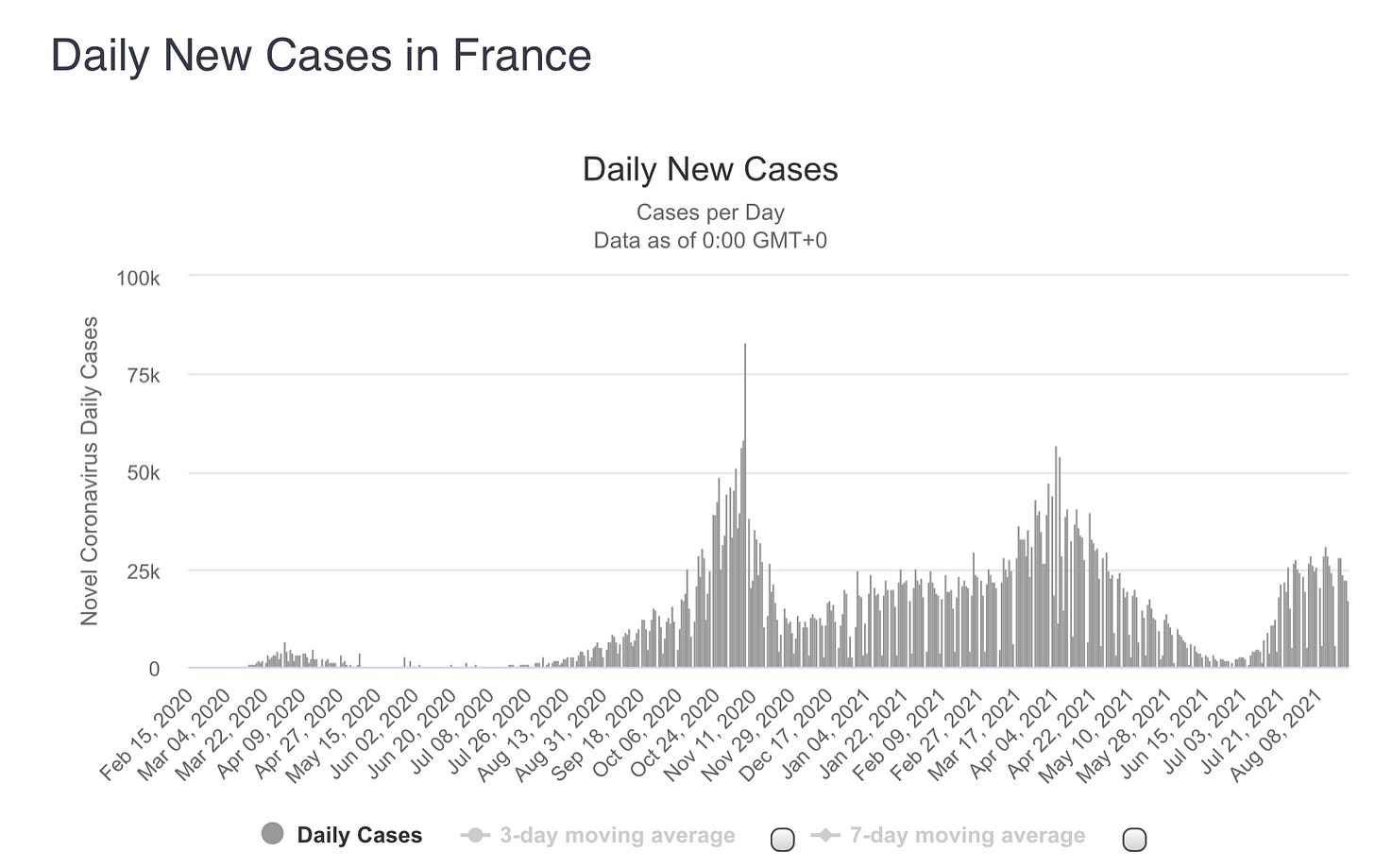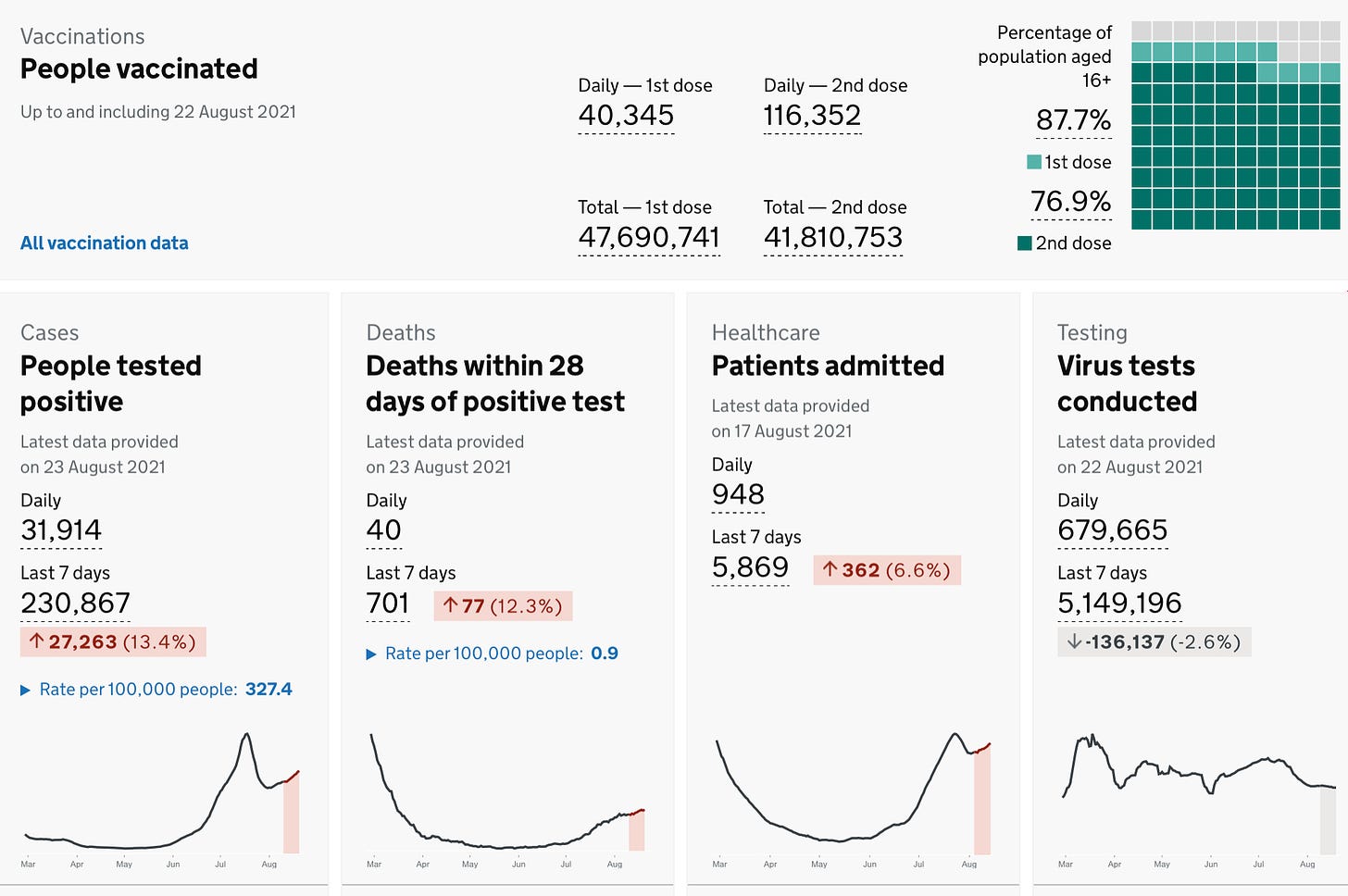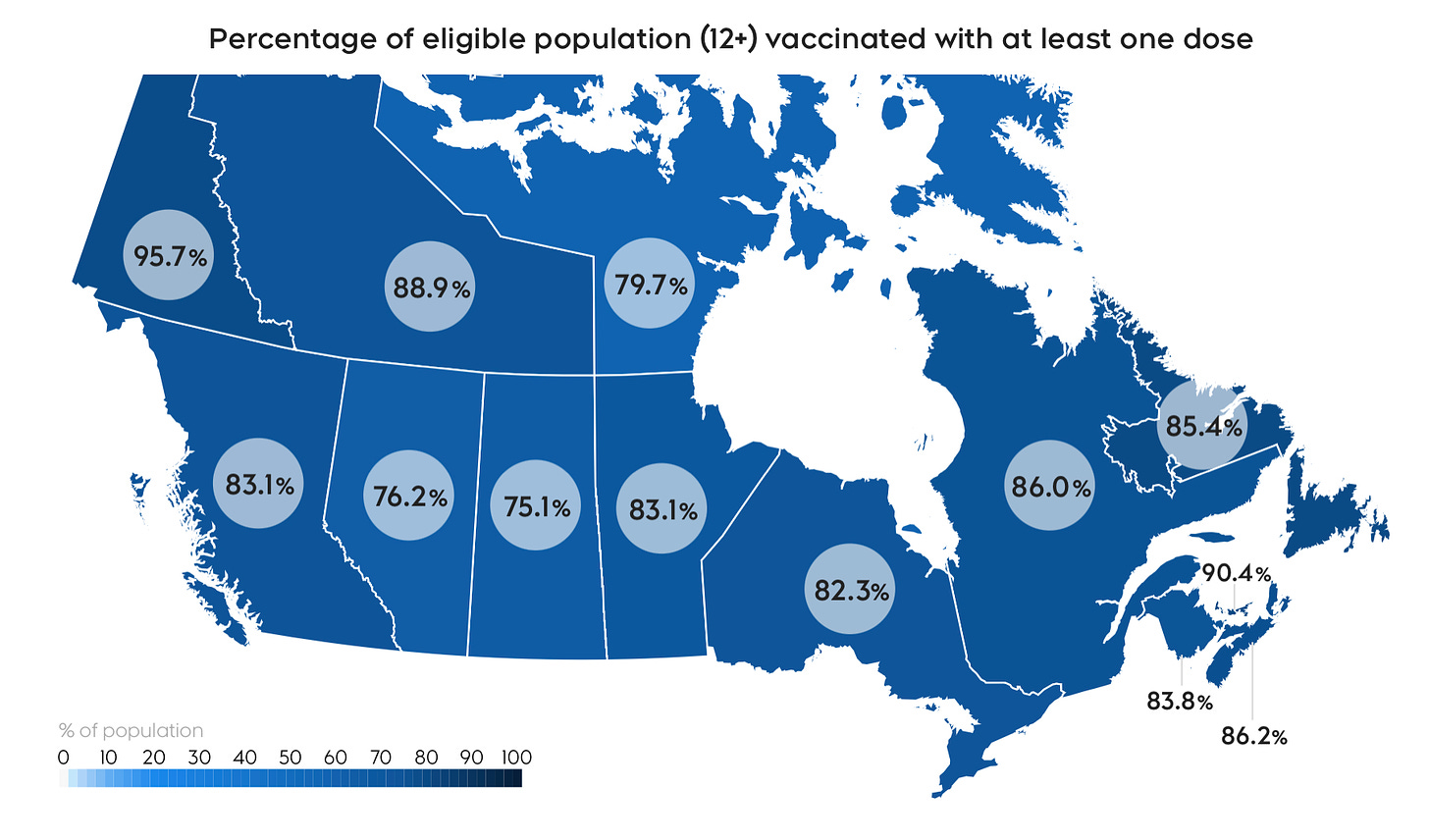🇩🇰
Denmark’s Statsminister Mette Frederiksen held a press conference today to update the coronavirus situation. It’s been a long time since Frederiksen has discussed the pandemic in front of reporters. Vaccines were a major part of what she had to say today.
The Prime Minister says the COVID situation has reached a point in Denmark where she does not think there will be anymore large country-wide lockdowns.
“Everyday life is fortunately back in most places. And we have the clear expectation that we can avoid major shutdowns in the future because we have the super weapon in place: the vaccines. Therefore, it is absolutely crucial that we get to the hold-outs in terms of vaccinations, so we can all go safely into the autumn.”
She credits the vaccination effort for putting Denmark in a place where restrictions can be lifted and life can return to somewhat normal despite the super-contagious Delta variant. But, she adds, on the vaccination front “the final sprint is coming.”
The chair of the COVID expert group Torben M. Andersen said at the press conference that the costs of locking down are so massive it should only be used in “absolute emergencies.”
“Shutdowns work very effectively to bring the infection down, but it also has very large economic consequences and costs for public health, well-being, freedom, and so on. So it's the emergency brake of the pandemic. We should preferably avoid getting into a situation where we have to pull it.”
-
Denmark’s National Health Board is taking steps to reinvigorate vaccination efforts, which it says are “lagging behind, especially among those 20 to 29 years old. To breath new life into the vaccination campaign and get coverage to 90% of the population by October vaccine sites are coming to all schools, colleges, and universities across Denmark to target eligible young people.
Pop up vaccination sites are also going to be set up in neighborhoods and even workplaces where vaccination uptake is low. To further make things easier, the requirement for an appointment to get a shot is being wiped away and all of Denmark’s vaccination centers will take any and all walk-ins.
To support this effort, the health board is launching what it calls a targeted communication campaign to inform “selected citizen groups” why they need to get vaccinated against the coronavirus.
While Denmark will take vaccination sites directly to all secondary schools, colleges, and universities to get young people inoculated. While there won’t be any at lower secondary or primary schools National Board of Health Director Søren Brostrøm says the idea was discussed but ultimately dismissed. He says adolescents aged 12 to 14-years-old require parents to be with their children to give consent when they get vaccinated.
-
Danish Statsminister Mette Frederiksen is appealing directly to vaccine -hesitant parents to man up and go get the jab. Frederiksen says children who live in what she called vulnerable residential areas with low vaccination rates are directly at risk.
“I personally think it is a pity for children who grow up in vulnerable housing areas who can not go to school because there may be family members who do not want to be vaccinated.”
Frederiksen is asking people to show “community spirit” and go get vaccinated.
The Statsminister and her Health Minister, Magnus Heunicke, are both warning that while the pandemic is under control, it’s also changing. Heunicke says that we are fast approaching what he called “an epidemic for the non-vaccinated.”
Mette Frederiksen says there are simply too many people under the age of 40 who are not vaccinated.
“In Denmark, it is voluntary for you roll up your sleeve and get a shot in the shoulder. But I would like to say very directly to you who have not yet been vaccinated: you risk being infected, and you risk passing the disease on to others around you. So make sure to get vaccinated for your own sake and for the sake of everyone else.”
Frederiksen says even if you survive the virus, people run the risk of long-COVID where symptoms, sometimes severe, persist for months after recovery.
-
The Director General of the Danish National Health Board equated vaccines to being a dam that has to be built higher and better in order to hold back a flood of COVID infections. Søren Brostrøm says the dam can only be built if people get vaccinated. At today’s press conference, he spoke directly to people who are vaccine-hesitant or outright opposed.
“Listen to us, take the vaccines. You have to take the vaccines for your own sake. We all have a responsibility. Viruses are color blind and anyone can get infected. The vaccine is extremely effective and safe. Listen to the health authorities and take the vaccine.”
He also urged people to stick to the facts and not get caught up in misinformation designed to manipulate people to oppose vaccination, risking severe sickness and possibly death.
-
The Danish National Health Board is urging people who have had COVID and recovered to get vaccinated. It notes that among people who have had COVID more than a month ago, some 28% have yet to book a vaccination appointment. It recommends anyone who’s had the coronavirus and recovered to begin the vaccination process four weeks after recovery.
The National health authority is also warning that the number of unvaccinated adolescents wing hospitalized is rising thanks to the Delta variant. Adolescents can also be seriously affected by COVID and suffer acute illnesses with difficulty breathing, fever, fatigue, and a loss of their sense of taste and smell. Some have late effects that can last for several months.
-
Denmark’s Health Minister Magnus Heunicke said today that a 3rd vaccine booster shot is a matter of when, not if.
“The health authorities are in the process of investigating when a third shot may become relevant.”
The National Health Board is beginning to administer third doses this week, but just to a very small group of vulnerable people.
The European Medicines Agency has yet to sanction administering third doses in Europe, saying the data just isn’t there yet to deem it necessary.
-
On the vaccination front, the number of people now fully vaccinated in Denmark has surpassed 4-million, or 68.9% of the total population. 74.7% have had a 1st dose as the gap between first and second doses administered really narrows.
Yesterday there were just 19,263 total inoculations done; of those a mere 3,050 were 1st doses.
-
The Danish government has bought a stake in Bavarian Nordic, which owns the rights to the made-in-Denmark AdaptVac COVID vaccine. The Danish government has reached a deal with Bavarian Nordic to sink DKK 800-million into the company to support vaccine development. The EU Commission approved the deal earlier today.
If the vaccine gets approved for use in Europe and of it is found to be highly effective against the coronavirus, then Denmark stands to benefit. The deal would see Bavarian Nordic repay the Danish government with vaccine doses and royalties. Denmark would also receive some of the profits if AdaptVac becomes a commercial success. On top of all that, it is expected “parts of the production of the vaccine” will be in Denmark.
Health Minister Magnus Heunicke:
“It is important that we in Denmark contribute to the development and research of vaccines against COVID, as it can potentially ensure Denmark access to a wider range of vaccines and greater security of supply. Corona is still in our society, and in the long run there may be a need to include new vaccine technologies, for example for booster vaccines and for protection against new variants. It is also important to support the development of vaccines suitable for distribution in developing countries, which can be stored at normal refrigerator temperatures.”
AdaptVac began as a joint venture between ExpreS2ion Biotechnologies and NextGen Vaccines, which originated at the University of Copenhagen.
On Monday, phase 2 clinical trials of the vaccine began.
The vaccine has so far shown a tremendous amount of potential. The Danish health ministry notes “if everything goes according to plan” then AdaptVac will submit an application for approval of use with the European Medicines Agency “by the end of 2022.”
-
Denmark is reporting 774 COVID infections and one more coronavirus death in the last day.
Yesterday, there were 115,149 total corona tests done, 49,011 PCR and 66,138 rapid, for a (PCR only) positivity percentage of 1.58%.
Infection activity continues to be focused almost entirely on those under the age of 50 and especially those under 40. The latest snapshot of new COVID activity by age group over the last seven days shows the infection burden is growing among younger people.
-
COVID hospitalizations (131) continue to climb (+7) while the number of infected in an ICU (18) dipped (-2) and of those the number on a ventilator (8) is unchanged day to day.
-
The head of the Staten Serum Institut says people should brace themselves for increasing infection numbers this fall. Henrik Ullum says the much more contagious Delta variant is going to drive infection activity up especially among those who are not vaccinated. He reminds people two doses of the currently approved vaccines offer a high level of protection against the variant.
Ullum says one silver lining is with the summer holidays over travel-related infection activity will decline.
🇸🇪
Sweden won’t update its COVID numbers until tomorrow (Tuesday).
-
The Swedish Public Health Agency is assessing the pandemic situation and doesn’t like what it sees. It’s crunched numbers on three different scenarios for the fall months ahead, and it says all three show increasing numbers of COVID cases. All three also see more pressure on Sweden’s hospitals. It says “current restrictions and recommendations need to remain for some time to come” as the Delta variant spreads.
The health agency says most concerning is the unpredictability of the epidemic now “the uncertainty is greater now than on previous occasions.”
CEO Johan Carlson says a lot of the unknown answers revolve around the Delta variant.
“This is partly due to the fact that much is still unknown about the virus. For example, it is not entirely clear how much more contagious the Delta variant is. There is also a high risk of cluster outbreaks among unvaccinated groups. People's contact behavior and compliance with the recommendations also affect how the spread of infection develops.”
Carlson says people need to comply with recommendations, including staying home if you have symptoms, getting tested, keeping your distance from others, and working from home where possible. But the biggest key is getting vaccinated.
In total, approximately 6.6 million people in the population over the age of 18 have now been vaccinated with at least one dose and 5.1 million people with two doses.
“A high vaccination coverage against COVID is absolutely necessary to reduce the spread of infection, morbidity and other consequences to life and health. It is also a prerequisite for society to be able to return to normal.”
The public health agency says only when vaccination rates are “high enough” can restrictions be removed and life return to near-normal.
-
Region Stockholm is now deploying mobile vaccination units to areas where vaccination rates are lagging. The first area on the list is Skärholmen, where 58.8% of adults over the age of 18 have one dose and 43.7% have two. The mobile vaccination clinic will be there offering drop-in vaccinations two days a week.
Vaccine Coordinator Magnus Thyberg:
“We see a great interest in vaccination in the county and are currently vaccinating around 110,000 -120,000 inhabitants every week. We are now facilitating vaccinations in areas with lower coverage by offering drop-in vaccinations to more people. We are redistributing mobile vaccination units to offer this in more areas with lower vaccination coverage.”
🇳🇴
Norway has added 604 new infections and had no new corona deaths since yesterday’s update.
COVID hospitalizations (53) have shot upward (+16) while the number of infected people in an ICU (12) is unchanged day to day and of those the number on a ventilator (7) has inched up (+1).
To date, 70.55% of Norwegians have had one vaccine dose and 47.66% have had both doses.
🇫🇮
Finland has registered another 371 infections in the last 24 hours.
So far, 3,949,985 1st vaccine doses (70.6% of the population) have been administered while 2,579,654 people (46.2%) have had both vaccine doses.
-
Finnish health officials have begun to prepare for a possible booster shot campaign. The Finnish government has yet to make a decision on administering a third dose.
Head of Infectious Diseases Control and Vaccines Unit Taneli Puumalainen told YLE that so far vaccines seem to retain their effectiveness.
"There are no signs now that the efficacy would have dwindled. If monitoring indicates that booster doses are necessary, then that's how we'll proceed.”
Any drive to administer a third booster shot in Finland would begin with vulnerable populations first.
🇩🇪
“The current number of vaccinations is too low” Germany’s Health Minister Jens Spahn is appealing to those who are hesitant to get vaccinated to bite the bullet and go get their shots. So far, 53.3 million people in Germany (64.1%) have one dose and 49 million (59%) are fully vaccinated.
🇫🇷
France is seeing a sudden surge in COVID hospitalizations. Reuters is reporting that there were 356 hospital admissions in a 24-hour period pushing total hospitalizations above 11,000 for the first time in over two months. There are 2,215 people in an ICU, which is the highest number since June 10.
France reported 5,166 new infections today.
🇬🇧
The United Kingdom is getting closer to having 90% of its population with at least one vaccine dose. Despite the achievement, its numbers are again rising. Public Health England reported 31,914 new infections and another 40 fatalities today.
Over the last seven days, the number of infections, deaths, and hospitalizations have all inched upward.
The UK is preparing for a possible booster shot campaign. It has inked a deal with Pfizer/BioNTech for another 35 million vaccine doses, which will arrive in the second half of 2022. The NHS is currently planning a campaign to administer a third dose for those over the age of 50, which could possibly begin this fall.
🇺🇸
The US Food and Drug Administration has granted full approval to the Pfizer/BioNTech COVID vaccine, the first vaccine to become fully approved for use. Pfizer had been operating on an emergency use authorization up until now. The hope is that this full approval for use will convince some of the vaccine hesitant in the States to go get their shots.
🇨🇦
The Government of Canada COVID dashboard has yet to be updated today.
-
On the vaccination front 27,630,383 1st vaccine doses (72.57% of the total population) have been administered while 24,795,608 people (65.13%) are now fully vaccinated.
In Ontario today the province is reporting 639 new COVID cases and of those 515 are among people who are either unvaccinated or not yet fully vaccinated. The remaining 124 are among people who have had both doses. There are 204 people in hospital and 151 in an ICU.
Quebec reported 376 new infections and one more death today. Hospitalizations (99) and ICU admissions (31) are both up.
In Atlantic Canada, New Brunswick has logged 58 new infections since Friday. Newfoundland and Labrador had two. Nova Scotia has yet to report.
Manitoba saw 109 new coronavirus cases over the last three days as health officials in the province brace for a fourth wave.
There were 219 infections and no new deaths in Saskatchewan yesterday.
Both B.C. and Alberta do not report on weekends and both provinces will file three days worth of COVID data later today.




